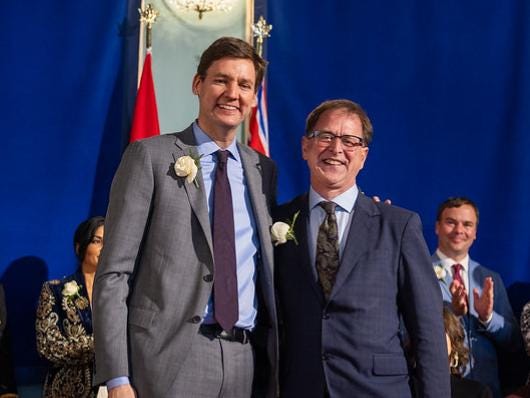Former Health Minister Adrian Dix, the man who brought Bill 36, the Health Professions and Occupations Act to British Columbia – with little consultation with health professionals in the province and which was subsequently rammed through by David Eby’s NDP government after debating less than a third of the clauses in the Act – is now in charge of energy in British Columbia.

He heads up the newly created Ministry of Energy and Climate Solutions, which the BC government backgrounder released on Monday describes as being responsible for the electricity, alternative energy and petroleum resource sectors in the province.
Its responsibilities include increasing and expanding electricity and low-carbon energy projects, ensuring energy policies align with climate goals, and performing oversight of the North Coast Transmission Line and BC Hydro’s capital plan.
The Climate Action Secretariat, which was formerly part of the Ministry of Environment, is now part of this new ministry. The purpose of the Secretariat is to drive change to meet BC’s greenhouse gas emissions targets, support municipal and regional efforts to achieve carbon neutrality, and work with industry to promote low-carbon business opportunities.
At a press conference following cabinet’s swearing-in ceremony, Eby said that because of the global situation and changes in the US, there’s going to be pressure on British Columbia’s economy, creating huge opportunities for growth. He says he needs an experienced minister who can “deliver in terms of the huge opportunity that’s in front of us, which is our clean electricity advantage here in British Columbia, both in generating electricity to sell to the United States and Alberta and generating electricity at low-cost to major industrial customers like hydrogen producers and others.”
Under Dix’s eight-year watch as Health Minister, British Columbians saw wait times for medical treatment including surgeries and diagnostics increase, cancer patients shuttled to the US for treatment, and the healthcare professionals’ shortage increase to such a level that frequent and repeated emergency room closures have become the norm.
Eby hopes that putting Dix in the role of energy minister will send a message that “the energy file is so critically important for our province’s economic future. Both the combination of responding to the challenge of climate change with our low-carbon electricity but also the job creation that it represents.
“The message about putting an experienced minister like Adrian into that role, is that this couldn’t be more important on the economic side for our province,” Eby said.
“I need someone who can deliver, and Adrian is that minister.”
More new ministries created
When Eby created the new ministry for Energy and Climate Solutions, he removed mines to its own new ministry – Mining and Critical Minerals, to be headed up by Jagrup Brar, MLA for Surrey-Fleetwood.
Mining and Critical Minerals will be responsible for advancing the province’s strategy for mining and critical mineral projects. It will oversee and support 17 new planned critical mineral projects, and oversee ongoing Mineral Tenure Act reform along with other regulatory processes and timelines.
A Housing and Municipal Affairs ministry has been created to oversee housing policy and municipal infrastructure needs. This ministry, headed up by Delta North MLA Ravi Kahlon, will be responsible for community charters and other government policies and legislation.
Eby said that the clear connection between housing and municipal affairs made this a logical move.
“It is important to ensure the rules that govern municipalities are consistent with housing goals,” Eby said. Putting them together reflects their direct linkage.
As part of the changes to the previously separate ministries for housing and municipal affairs, Eby moved immigration settlement services from municipal affairs to Post Secondary Education and Future Skills.
The Union of British Columbia Municipalities and local government relationships will move to the Intergovernmental Relations Secretariat in the Office of the Premier.
The Transportation and Infrastructure Ministry has been broken up into two separate ministries, the Transportation and Transit Ministry will be headed by long-time Port Coquitlam MLA Mike Farnworth, while the Infrastructure Ministry falls to North Vancouver-Lonsdale MLA Bowinn Ma.
Eby said that Ma’s background in engineering and major project delivery will bring a project planning perspective to government, as the province brings capital planning and procurement into a single ministry.
The Infrastructure Ministry will be responsible for major capital planning, procurement and delivery for items such as schools, court houses, correctional and health facilities.
Transportation and Transit will focus on how people move around the province and will continue to deliver on major projects like the widening of Highway 1, the Surrey to Langley Sky Train, George Massey Tunnel replacement and a new Patullo Bridge.


